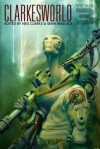

I laughed, and I grimaced, and I ran a gamut of other emotions, from surprise, to disbelief, to pain and sympathy.
I started to follow a print while listening because at first I did not always catch what Fisher was saying. There was much pausing, and after a while I kept doing it because there are minute differences here and there.
This is a very interesting lady. What astounded me the most is her capacity to write her 19-year-old self, with all the embarrassment and self-doubt. It's powerful enough to make you uncomfortable by proxy.
Back then I was always looking ahead to who I wanted to be versus who I didn’t realize I already was, and the wished-for me was most likely based on who other people seemed to be and the desire to have the same effect on others that they had had on me.
She writes an almost nude picture of herself, the good, the bad, the WTF (and there were many, many instances where I went WTF), the petty, the shy, the self-aware, the painfully young. There is this sense of "I'm at the last part of the slide, and I have little fucks left to give" mixed with the "still want to be liked".
There is a lot about her relationship with the character, a lot mixed feelings that in the end, amount to mostly positive.
“You were my first crush.” I heard it so much I started asking who their second one was. We know what a first crush is to a teenager, but what does it mean to a five-year-old?
“But I thought you were mine! That I had found you—I was the only one who knew how beautiful you were—because you weren’t beautiful in that usual way women in film are, right?”
He realizes that I might take what he’s saying wrong. He doesn’t mean it that way. I reassure him, touch his arm; why not give him an anecdote? “I know what you mean, it’s fine. Go on.”
He checks my face to see if I mean it. I do. He continues, “So my friend, when I tell him about my crush, he goes, ‘Oh yeah, she’s awesome! I have a total crush on her, too. Everyone does.’ I got upset. I coulda punched him.”
“Why?”
“Because you were mine and I wanted to be the one who loved you. Me, maybe even help you . . .” He got embarrassed. “Anyway—I wanted to tell you.” He shrugs, then adds, “Thanks for my childhood,” and walks off. Wow, what a thing to be given credit for, to be thanked for! Because he didn’t mean his whole childhood—he meant the good bits. The parts he escaped to.
It was a weird and nostalgic ride.
If you can find a common language that runs from five to eighty-five, you’ve got yourself something, and Star Wars fans have something.


















